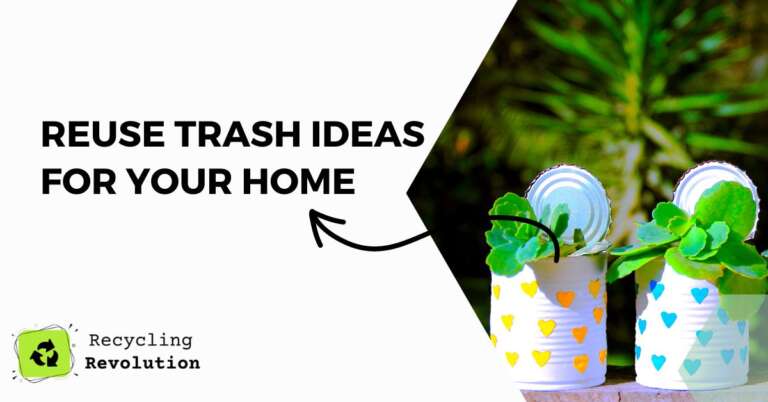In the age of the disposable culture, it’s become painfully evident that our trash is coming back to haunt us. From overfilled landfills to ocean pollution, waste has become one of the primary environmental concerns of the 21st century. It’s high time we shifted our focus from “use and discard” to “reuse and repurpose.”
TL;DR: The best way to manage waste is to reuse it creatively and consciously. Incorporating innovative reuse methods can significantly decrease the volume of trash generated and promote sustainable living. The subsequent sections provide in-depth insights and actionable tips on doing just that.
Understanding the Importance of Reuse
Why does reusing matter? A study by the Environmental Protection Agency revealed that the average person produces about 4.9 pounds of trash a day, with a significant portion ending up in landfills. Reusing not only reduces the amount of waste but also conserves resources and energy that would otherwise be spent on producing new items.
Economic Benefits
Reuse can save consumers money by extending the life of products and materials. By reusing items, you often save on the cost of buying new replacements.
Environmental Impact
Note: A major benefit of reuse is its ability to reduce the need for new raw materials. Mining, logging, and processing these materials create substantial air and water pollution.
Creative Ways to Reuse Trash
There’s an adage that one person’s trash is another person’s treasure. Let me dive deep into some of my favorite ways to give trash a second life.
1. Repurpose Glass Jars and Bottles
Whether it’s an empty jam jar or an old wine bottle, glass containers have a multitude of uses. I recommend transforming them into chic flower vases, homemade candle containers, or even DIY soap dispensers.
2. Old T-Shirts Turned into Rags
Instead of tossing out those worn-out t-shirts, cut them up and use them as cleaning rags. Their absorbent material makes them perfect for wiping surfaces or cleaning spills.
3. Cardboard Boxes as Organizers
Those e-commerce packages can stack up! Flatten smaller boxes to use as drawer dividers or keep them intact for storage solutions. Get crafty by wrapping them in leftover wrapping paper for a decorative touch.
4. Reuse Egg Cartons
Egg cartons can be ideal for organizing tiny items, from jewelry to screws. Additionally, they can be used as seed starters for your garden.
The Role of Upcycling
One step beyond reuse is upcycling: the act of taking something old and turning it into something new and improved. A report by The Upcycling Institute noted that upcycling not only reduces waste but also encourages creativity and innovation.
Some Upcycling Inspirations:
Old Ladder as a Bookshelf: An antique ladder can be mounted horizontally on a wall to serve as a rustic bookshelf or towel rack.
Wine Cork Bulletin Board: Accumulate those wine corks and arrange them in a frame to craft a unique bulletin board.
Creating a Community of Reusers
Engaging your community in your reuse endeavors can amplify your impact. Hosting a garage sale, organizing a swap meet, or participating in online exchange platforms can help divert items from the landfill and into the hands of someone who finds value in them.
Beyond the Basics: Furthering Your Reuse Endeavors
Understanding the need for reuse and getting started is only the tip of the iceberg. To truly make a dent in waste reduction, a more profound commitment and broader understanding are essential.
Building a Zero-Waste Lifestyle
Embracing a zero-waste lifestyle means attempting to eliminate all waste from your daily life, aiming for a life where trash is essentially non-existent. Here are some key components:
1. Composting Organic Waste
If you’re serious about reducing waste, you’ll inevitably come across the topic of composting. All those food scraps, which make up a sizable portion of household waste, can be turned back into nutrient-rich soil through composting.
I recommend starting with a small compost bin and slowly scaling up as you become more comfortable.
2. DIY Personal Care and Home Products
Many personal care items and home cleaning products come in disposable containers. Crafting your own solutions can not only be cost-effective but also drastically reduce packaging waste.
For instance, making homemade toothpaste, lotions, or all-purpose cleaners can save both money and the environment.
Tech Trash: E-Waste Repurposing
One of the fastest-growing waste streams is electronic waste (or e-waste).
From old mobile phones to outdated laptops, our tech trash is piling up. Instead of discarding them:
1. Donation Stations
Many non-profits accept used electronics, refurbishing them for underprivileged communities or schools.
I recommend finding local charities that can extend the life of these gadgets.
2. Artistic Endeavors
Did you know that old circuit boards, wires, and computer parts can be turned into artistic masterpieces? From jewelry to sculptures, there’s a world of potential in what might seem like junk.
Clothing and Textile Waste
Fashion is fantastic, but it’s also a significant contributor to landfills. Here’s how to manage that:
1. Clothing Swaps
I recommend hosting or participating in clothing swap events. This not only refreshes your wardrobe without buying new clothes but also ensures your old outfits find new loving homes.
2. Fabric Scraps for Crafting
Those little bits of fabric left over from sewing projects, or even worn-out clothes, can be repurposed. Quilting, patchwork projects, or simple DIY crafts like making pot holders or hair accessories are great ways to use up every bit.
Food Packaging and Storage
A lot of the trash we produce comes from the kitchen. From food packaging to storage solutions, there’s a lot we can optimize.
1. Beeswax Wraps
Instead of cling film or aluminum foil, consider beeswax wraps. They’re reusable, sustainable, and a fantastic way to keep food fresh.
2. Reusable Shopping Bags
If you haven’t already, switch to cloth or other durable shopping bags. Not only do they reduce plastic waste, but they’re also sturdier and can carry more weight.
Educating and Advocating
Lastly, while individual actions matter, collective action has a more considerable impact. I recommend joining or forming local groups dedicated to sustainable living, attending workshops, or even leading awareness sessions in your community.
Every conversation around waste reduction, every shared tip, and every collective endeavor brings us closer to a planet that thrives.
As we venture into a world conscious of its waste footprint, each reused item and upcycled project contributes to a greener and more sustainable environment. Whether it’s through arts, education, or simple daily habits, there’s always a way to turn trash into treasure.
Conclusion
The journey from a throwaway culture to a sustainable one isn’t instantaneous. It requires conscious decisions, creativity, and a commitment to the planet.
By embracing the ethos of reuse, we not only minimize our ecological footprint but also make strides towards a brighter, cleaner, and more sustainable future.
FAQs
How is reusing different from recycling?
While both are essential for waste reduction, reusing involves using an item more than once in its original form, whereas recycling involves breaking down an item to its raw materials to create new products.
Can I make money from reusing trash?
Absolutely! Upcycled products often have a unique charm and can be sold online or at craft fairs. Plus, organizing community swap meets or garage sales can also be profitable.
What if I lack creativity for upcycling?
No worries! There are countless online resources, workshops, and community groups dedicated to sharing ideas and fostering creativity in reuse and upcycling. Just start, and inspiration will follow.

